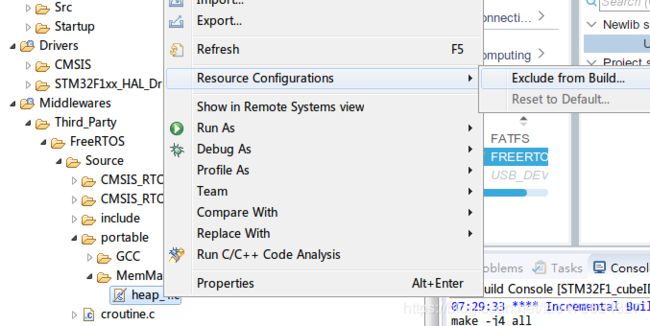【stm32】stm32cubeIDE在freeRTOS无法printf float 浮点数
0.引言
说起来,本来只是想尝个鲜,看看cubeIDE是怎么用的,结果随手做个实验freeRTOS+串口的实验就跌进了坑,花了我一个星期往外爬,在此做个记录。
cubeIDE使用起来。感觉很多初始化代码出比较快,一些资源使用也很直观,但是内部的SDK使用起来还是有些坑,并不是那么的完善。
看看这些吐槽,哈哈哈。



哈哈哈欢乐,SDK团队也不容易啊,一直受到全球人民的鞭策。
以前都是很信任官方SDK的,自从我转来做SDK之后,才发现bug也不少,毕竟也是人写的。只不过版本控制和代码review、merge要严格很多。
多一些宽容多一些理解多一些等待,SDK和客户一起成长 ~
1. 实验
1.1 原理
想用cubeIDE在freeRTOS下printf浮点数,你需要按照下面这么几个步骤来做:
- 驱动串口(图形化引脚配置,cubeIDE的驱动代码生成)
- 使用printf(串口重定向)
- 使用printf输出浮点数 (菜单勾选)
- 在freeRTOS中使用printf (修改task默认堆栈大小,默认128 word小了,会进hardfault)
- 怎么使用printf在freeRTOS中输出浮点数 (本文内容,增加第三方提供的补丁)
其中,1、2、3、4都是很常规的操作,在网上能搜到不少教程和帖子。
实在不行可以看我的上一篇
一般来说,到这里就应该结束了,没想到让我爬了一个星期。
(至少截止目前,2020.7.16,cubeIDE v1.3.0版本)依然存在在freeRTOS下,线程中使用printf、USB库等接口的异常。
因为这些接口使用了malloc等接口,而不是freeRTOS提供的有线程保护的pvPortMalloc等接口,ST官方自己实现的_sbrk函数有些问题(sysmem.c里),导致线程中一些调用了系统自身malloc的函数接口出问题。
- 使用第三方的printf实现,这样规避了ST自带的printf会malloc的问题,但是你需要自己确认其他的代码(printf之外的)是否还有这个问题
- 所有的包括ST生成的系统代码的malloc等接口全部改成freeRTOS提供的pvPortMalloc等接口。但是这里freeRTOS没有提供realloc的实现,printf却需要使用、
- 使用第三方补丁,使用一些hook的API。
1.2 步骤
这里我们使用第三种方法。
具体步骤如下:
- 添加heap_useNewlib.c(可以在文末复制)
- 把sysmem.c 和 FreeRTOS里的heapX.c从编译内容中排除。点击文件,右键Resource configuration - exclude from build
- ioc文件中的freeRTOS USE_NEWLIB_REENTRANT 选择enable.
1.3 结果
2. 深入探究
ST的bug是怎么形成的?
heap_useNewlib.c做了些什么?
参考链接
- 重要的第三方补丁说明 - 大神讲解详细
- 解决方案
- 讨论帖
- 第三方工程,解决malloc问题
附录
另外附上heap_useNewlib.c全文,出自参考链接一。
/**
* \file heap_useNewlib.c
* \brief Wrappers required to use newlib malloc-family within FreeRTOS.
*
* \par Overview
* Route FreeRTOS memory management functions to newlib's malloc family.
* Thus newlib and FreeRTOS share memory-management routines and memory pool,
* and all newlib's internal memory-management requirements are supported.
*
* \author Dave Nadler
* \date 7-August-2019
* \version 23-Sep-2019 comments, check no malloc call inside ISR
*
* \see http://www.nadler.com/embedded/newlibAndFreeRTOS.html
* \see https://sourceware.org/newlib/libc.html#Reentrancy
* \see https://sourceware.org/newlib/libc.html#malloc
* \see https://sourceware.org/newlib/libc.html#index-_005f_005fenv_005flock
* \see https://sourceware.org/newlib/libc.html#index-_005f_005fmalloc_005flock
* \see https://sourceforge.net/p/freertos/feature-requests/72/
* \see http://www.billgatliff.com/newlib.html
* \see http://wiki.osdev.org/Porting_Newlib
* \see http://www.embecosm.com/appnotes/ean9/ean9-howto-newlib-1.0.html
*
*
* \copyright
* (c) Dave Nadler 2017-2019, All Rights Reserved.
* Web: http://www.nadler.com
* email: [email protected]
*
* Redistribution and use in source and binary forms, with or without modification,
* are permitted provided that the following conditions are met:
*
* - Use or redistributions of source code must retain the above copyright notice,
* this list of conditions, ALL ORIGINAL COMMENTS, and the following disclaimer.
*
* - Redistributions in binary form must reproduce the above copyright notice, this
* list of conditions and the following disclaimer in the documentation and/or
* other materials provided with the distribution.
*
* THIS SOFTWARE IS PROVIDED BY THE COPYRIGHT HOLDERS AND CONTRIBUTORS "AS IS" AND
* ANY EXPRESS OR IMPLIED WARRANTIES, INCLUDING, BUT NOT LIMITED TO, THE IMPLIED
* WARRANTIES OF MERCHANTABILITY AND FITNESS FOR A PARTICULAR PURPOSE ARE
* DISCLAIMED. IN NO EVENT SHALL THE COPYRIGHT HOLDER OR CONTRIBUTORS BE LIABLE FOR
* ANY DIRECT, INDIRECT, INCIDENTAL, SPECIAL, EXEMPLARY, OR CONSEQUENTIAL DAMAGES
* (INCLUDING, BUT NOT LIMITED TO, PROCUREMENT OF SUBSTITUTE GOODS OR SERVICES;
* LOSS OF USE, DATA, OR PROFITS; OR BUSINESS INTERRUPTION) HOWEVER CAUSED AND ON
* ANY THEORY OF LIABILITY, WHETHER IN CONTRACT, STRICT LIABILITY, OR TORT
* (INCLUDING NEGLIGENCE OR OTHERWISE) ARISING IN ANY WAY OUT OF THE USE OF THIS
* SOFTWARE, EVEN IF ADVISED OF THE POSSIBILITY OF SUCH DAMAGE.
*/
// ================================================================================================
// ======================================= Configuration ========================================
// These configuration symbols could be provided by from build...
#define STM_VERSION // use STM standard exported LD symbols
//#define SUPPORT_MALLOCS_INSIDE_ISRs // #define iff you have this crap code (ie unrepaired STM USB CDC)
#define SUPPORT_ISR_STACK_MONITOR // #define to enable ISR (MSP) stack diagnostics
#define ISR_STACK_LENGTH_BYTES 512 // #define bytes to reserve for ISR (MSP) stack
// ======================================= Configuration ========================================
// ================================================================================================
#include 






